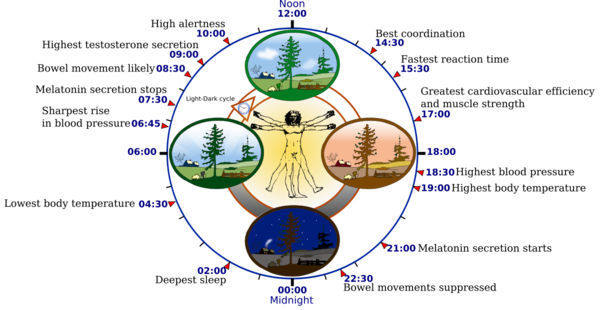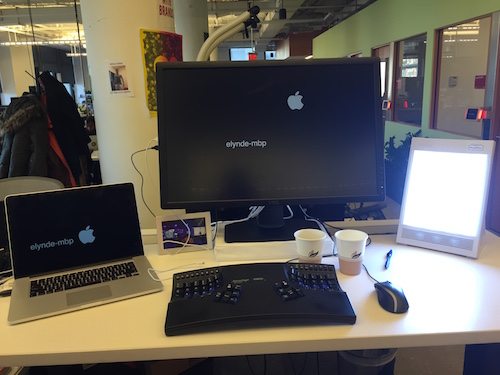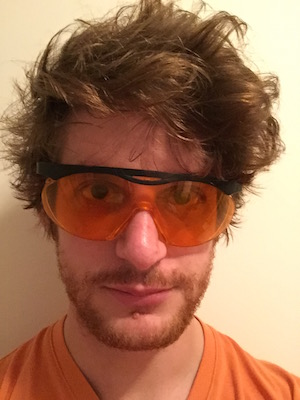Light Hacking
February 2015Background
A lot of people at work have asked why, every morning in the winter, I have a bright light on my desk shining into my face. Seems like a reasonable thing to wonder about so I thought I’d explain a bit about why I lightbox and the important role that light plays in our brains.
First of all, I’m a 27-year old dude who writes PHP for a living. Please don’t make any serious medical decisions based off what I’m saying. If you’re not sleeping well, don’t hesitate to go to a doctor. Bad sleep is a serious medical issue.
Melatonin and the day-night cycle
Our bodies follow a roughly 24-hour cycle known as the circadian rhythm.

Here’s the tl;dr version of what’s going on:
- Sun sets. It’s dark outside. Eyes detect that.
- Body responds by producing melatonin, a hormone which makes you sleepy.*
- Sleep.
- Wake. Sun is shining. Eyes detect that.
- Body responds by stopping melatonin production so you aren’t sleepy anymore.
* = this is the current thinking but it’s actually not 100% certain. Scientists are still learning about the role of melatonin in the body. Also worth noting: synthetic forms of melatonin are often taken as a sleep aid since it’s available over-the-counter, cheap and reasonably safe for short-term usage.
Light is actually only one of several cues or Zeitgebers which our body uses to determine where in this cycle we are but it appears to be the strongest one we know about. Another common one is eating/not eating which you’ve probably heard of people trying as a jetlag avoidance strategy. It’s unclear how effective that strategy is but probably less effective than controlling light exposure.
SAD in the winter
In the winter, there is dramatically less daylight than other seasons. Couple this with the fact that most of us spend the few hours of sunlight inside working and our brains might not get a strong enough “it’s daytime” signal due to the lack of light. Therefore, our bodies keep producing melatonin and we end up feeling sluggish. It’s also common to feel depressed and just want to sleep all day due to the large amount of melatonin juicing through our bodies. This is actually a well-recognized condition known as Seasonal Affective Disorder or “SAD” for short.
Luckily, there’s also a relatively safe, cheap, well-studied treatment: light therapy or “lightboxing” as I call it. This is what it looks like:

Here’s how it works:
- Shine this light in your face every morning for 30 minutes or so.
- Make sure it’s within about two feet or so of your face
- Your body will catch on, stop thinking it’s night and stop producing melatonin.
- Blue light might be more effective than white light but there have been some questions about safety so I’m just holding off on it. More on blue light later.
Important note: mental health is serious. If you’re experiencing depression, don’t just start lightboxing. Go to a mental health professional. First of all, a light box isn’t a direct substitute for antidepressants, it’s a tool for this specific seasonal pattern. Even if you experience SAD, antidepressants can be useful to stop the downward spiral until you’re stable enough to wane off them and try lighter approaches like lightboxing. Another thing to look out for is that sometimes lightbox can trigger manic episodes in people with bipolar disorder. Again, if you’re depressed, go to a professional. If you are afraid/nervous/embarrassed/don’t know where to find one, feel free to reach out to me and I’ll help you find one.
The lightbox can be also useful if you can’t stay awake later in the day since you can use it suppress melatonin production at any time. I don’t usually have this problem (unless jetlagged) but just an fyi in case you do.
Artificial lighting
Just like how we’re not doing well on getting light during the day (especially during the winter) we’re also not doing well on getting darkness during the night.
Having the light on in the house might not be ideal but I’m personally not super worried about it. If the light bulbs on the ceiling aren’t powerful enough to suppress my melatonin production during the day when I want them to, then I figure they probably aren’t doing it at night either. I’m more worried about the glowing digital light boxes that we’re pointing directly at our face with closer and closer range - phones and computers.
Part of me wants to be all “don’t use electronics at night!” live like the olden days. That’s the same part of me that thinks it’d be fun to go move to a farm or live in the woods for a while. The practical side of me realizes that not using computers or phones after dark just isn’t possible. Ok maybe it’s possible but is it really the best use of my finite supply of willpower (go read about decision fatigue). This is a situation that just calls for a hack.
On a computer, it’s easy, there’s an app called Flux which will dim your screen and remove the blue light which is what has the greatest effect on melatonin production.
On a phone or tablet, it’s a little tougher. There’s an Android equivalent that I used for a while though it had some pretty wacky issues. On iOS, you’re screwed unless you jailbreak your phone (no thanks). I originally looked into if there were screen filters and then goggles of some sort. I eventually found these glasses on Amazon for like eight bucks which a bunch of people already use for this purpose! I’ve been using them for a while and they seem to help if I’m sitting on my phone for a long period of time at night.

Whatever dude, I feel fine with out all this nutjob gear
Everyone is different, maybe your body isn’t as affected. I wrote this up because people at work ask about the lightbox a bunch and because I’m a huge fan of sleep and am always evangelizing it (it’s amazing try it some time).
The lightbox is really only necessary if you experience SAD and some people can probably stare at their phone for hours and the fall asleep. Since many people don’t sleep enough, you might fall asleep easily because you’re just chronically sleep deprived.
Even so, the amount that we are screwing with our melatonin staring at screens is a little worrisome. It’s possible that there are risks we don’t know about.
I hope that gives people some good background on why I lightbox in the morning in the winter. Let me know if you have questions and I hope this information helps some of you!